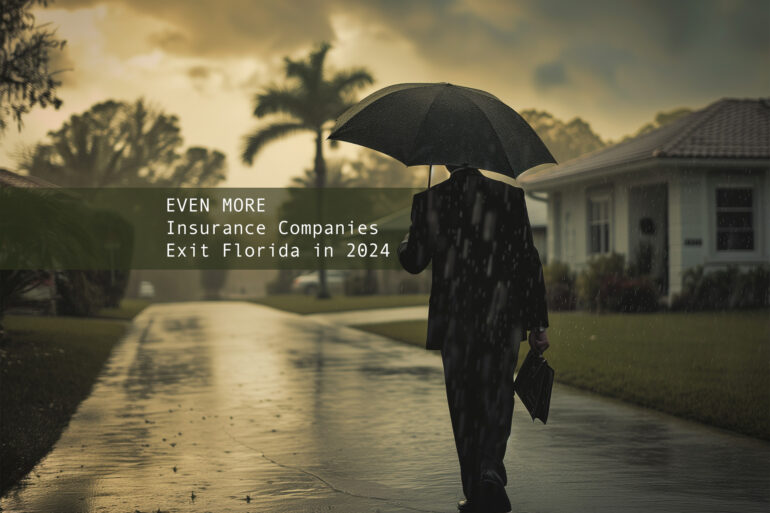This is Why Home Insurance Companies are Exiting the Market in 2024
In recent years, the landscape of the home insurance market has made quite a shift. A growing number of insurance companies are opting to step back from the market, a trend that’s becoming more pronounced as we move into 2024. This isn’t just a blip on the radar; it’s a significant change reshaping how real estate investors approach risk management and property investment. Understanding why these companies are withdrawing and the implications for those investing in real estate is crucial for navigating the market’s changing tides.
As extreme weather events become more common, the insurance landscape across various regions will likely experience similar shifts.
The Rising Threat of Natural Disasters
The escalation of natural disasters plays a significant role in home insurance companies taking off. It’s a hard truth, but these disasters are occurring with greater frequency and ferocity. From hurricanes battering coastal regions to wildfires engulfing vast areas, the intensity and unpredictability of these events are on the rise. For insurance companies, this uptick in natural disasters isn’t just a logistical nightmare; it’s a financial vortex.
According to the First Street Foundation’s findings, there are almost 50 million properties with a minor wildfire risk, 20.2 million with moderate risk, 2.7 million with severe risk, and 1.5 million with extreme risk. That’s over 71.8 million homes that have some level of wildfire risk. At this rate (11% growth), almost 80 million homes will be at risk by 2050.
Wildfires aren’t the only natural disasters scaring insurance companies away. The National Oceanic and Atmospheric Administration (NOAA) predicts the likelihood of an above-average hurricane season to 60%, which is double what they predicted earlier this year. There’s no question that hurricanes do some serious damage. In just the last few years, we’ve seen hurricane Ian (2022) cause over $115 billion in damages, Ida (2021) cause over $82.4 billion, and Idalia (2023) cause nearly $20 billion.
The statistics are telling: The number and severity of natural disasters have increased dramatically over recent years. The impact is twofold. First, there’s the direct damage caused by these events. Then, there’s the cascading effect of increased insurance claims and the subsequent financial strain on insurance providers. This double-edged sword is cutting deep into the insurance industry, compelling many companies to reassess their involvement in certain high-risk areas.
A Sue-Happy Society
The pressure on home insurance companies doesn’t just come from natural disasters; excessive litigation is also causing problems. Before we point the blame at all lawyers for doing their jobs, it’s important to consider the unintended consequences of several laws and Supreme Court decisions at play. Contractors, lawyers, and homeowners leverage loopholes to inflate the number and value of claims payments.
In 2020, the Florida Office of Insurance Regulation reported that Florida accounts for 76.45% of all homeowners’ lawsuits opened against insurance companies nationwide. What stands out is that Florida only accounted for 8.16% of insurance claims during the same year. That just shows how people were much quicker to sue than open a claim. In fact, lawsuits have tripled in 2020 to just over 85,000.
Being sued doesn’t necessarily mean losing the case or having to pay a settlement. At the same time, defending these suits costs time and money that insurance companies would rather see go to other places.
As traditional insurance options disappear, investors need to adapt.
The Financial Strain on Insurance Companies
Financial sustainability and profit are at the heart of any business, and insurance companies are no exception. Recently, home insurance companies have been experiencing a financial squeeze. Their loss ratios, the percentage of premiums paid out in claims and expenses, have been climbing, particularly in disaster-prone areas. The bottom line is that they aren’t making as much or enough money.
Take Florida and California, for example. These states have become illustrative case studies of this financial strain. Between 2016 and 2019, for every $100 in premiums Florida home insurers received, they shelled out $117.50 in losses and expenses. On a national level, this figure hovered around a barely break-even point of $100.70 during the same period. This imbalance has led prominent insurers, like State Farm and Allstate, to scale back their offerings in places like Florida.
In California, despite profitable years, insurers still faced a combined ratio of 108.1% over the past decade. In more stark terms, for every $100 received in premiums, California’s home insurers paid out over $200 in 2017 and 2018 alone. These numbers paint a clear picture of insurers’ financial hurdles, leading to their gradual withdrawal from the market.
These two states are more than just individual cases; they’re examples of a larger trend. The insurance industry’s struggles in these areas highlight the growing national challenges. As extreme weather events become more common, the insurance landscape across various regions will likely experience similar shifts.
The Ripple Effect on Real Estate Investors
The retreat of insurance companies from markets like Florida and California can cause a ripple effect on real estate investors. Property values in areas prone to natural disasters could be affected as insurance becomes harder to secure or just becomes more expensive.
This situation makes investments in these regions riskier and unaffordable. Investors are finding themselves in a tough spot balancing the potential high returns of properties against the increased risk and cost of insuring them.
As traditional insurance options disappear, investors need to adapt. Some are turning to alternative insurance products or seeking out insurers who specialize in high-risk areas. Others are reevaluating their portfolios completely to make mitigating risk as part of their overall strategy.
Investors who can skillfully navigate these changes stand to maintain and even enhance the resilience and profitability of their investments.
Strategies for Investors
For real estate investors, adaptability and strategic thinking are key elements to thrive in markets where home insurance providers are pulling out. Here are some additional tips:
- Explore Alternative Insurance Options: Look beyond traditional insurance providers. Some companies specialize in high-risk areas or offer non-standard policies that might suit your needs better.
- Assess Risks Thoroughly: Conduct a detailed risk assessment before investing in a property. Consider factors like the likelihood of natural disasters and the availability and cost of insurance.
- Diversify Your Portfolio: Avoid putting all your eggs in one basket. Diversifying your investments across different regions and property types can help mitigate risk.
- Stay Informed: Keep abreast of changes in the insurance market and regional trends. This knowledge can help you make more informed investment decisions.
- Build a Network: Connect with other investors, insurance experts, and industry professionals. Sharing insights and strategies can be invaluable in navigating these challenges.
- Consider Self-Insurance: In some cases, creating a reserve fund to cover potential losses might be your best strategy, especially if insurance costs get too high to be able to afford.
Real estate investors can better navigate the evolving insurance landscape, manage risks effectively, and continue to find valuable investment opportunities even in a market that is becoming increasingly challenging.
Navigating the New Normal in Real Estate Investment
The withdrawal of insurance companies from the market, driven by the increased frequency and severity of natural disasters coupled with increased legal action, is not just an isolated trend. It’s a symptom happening across the insurance industry and the real estate market.
For real estate investors, this changing landscape presents new challenges but also opens doors to innovative strategies. The key takeaway is the importance of adaptability and informed decision-making. Investors who can skillfully navigate these changes stand to maintain and even enhance the resilience and profitability of their investments.
In essence, the market’s evolution isn’t just a challenge; it’s an invitation for savvy investors to rethink and refine their approaches. Only through embracing these changes and adapting strategies accordingly can real estate investors continue to thrive, even in a market full of uncertainty and change.








